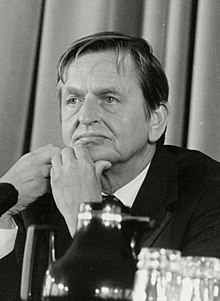

Prime Minister of Sweden
Sven Olof Joachim Palme 30 January 1927 Stockholm, Sweden
28 February 1986(1986-02-28) (59) Sveavägen, Stockholm, Sweden
8 October 1982 – 28 February 1986
20th-century Swedish politician; Prime Minister from 1969-76 and 1982-86 Sven Olof Joachim Palme (/ˈ p ɑː l m ə / ; Swedish: ( listen ) ; 30 January 1927 – 28 February 1986) was a Swedish politician and statesman who served as Prime Minister of Sweden from 1969 to 1976 and 1982 to 1986. Palme led the Swedish Social Democratic Party from 1969 until his assassination in 1986. A longtime protégé of Prime Minister Tage Erlander, he became Prime Minister of Sweden in 1969, heading a Privy Council Government. He left office after losing the 1976 general election, which ended 40 years of unbroken rule by the Social Democratic Party. While Leader of the Opposition, he served as special mediator of the United Nations in the Iran–Iraq War, and was President of the Nordic Council in 1979. He faced a second defeat in 1979, but he returned as Prime Minister after electoral victories in 1982 and 1985, and served until his death. Palme was a pivotal and polarizing figure domestically as well as in international politics from the 1960s onward. He was steadfast in his non-alignment policy towards the superpowers, accompanied by support for numerous liberation movements following decolonization including, most controversially, economic and vocal support for a number of Third World governments. He was the first Western head of government to visit Cuba after its revolution, giving a speech in Santiago praising contemporary Cuban revolutionaries. Frequently a critic of United States and Soviet foreign policy, he expressed his resistance to imperialist ambitions and authoritarian regimes, including those of Francisco Franco of Spain, Leonid Brezhnev of the Soviet Union, António de Oliveira Salazar of Portugal, Gustáv Husák of Czechoslovakia, and most notably John Vorster and P. W. Botha of South Africa, denouncing apartheid as a "particularly gruesome system". His 1972 condemnation of American bombings in Hanoi, comparing the bombings to a number of historical "crimes" including the bombing of Guernica, the massacres of Oradour-sur-glane, Babi Yar, Katyn, Lidice and Sharpeville and the extermination of Jews and other groups at Treblinka, resulted in a temporary freeze in Sweden–United States relations. Palme's assassination on a Stockholm street on 28 February 1986 was the first murder of a national leader in Sweden since Gustav III in 1792, and had a great impact across Scandinavia. Local convict and addict Christer Pettersson was originally convicted of the murder in district court but was unanimously acquitted by the Svea Court of Appeal. On 10 June 2020, Swedish prosecutors held a press conference to announce that there was "reasonable evidence" that Stig Engström had killed Palme. As Engström committed suicide in 2000, the authorities announced that the investigation into Palme's death was to be closed. The 2020 conclusion has faced widespread criticism from lawyers, policemen and journalists, decrying the evidence as only circumstantial, and too weak to ensure a trial had the suspect been alive.

We use cookies
We use cookies and other tracking technologies to improve your browsing experience on our website, to show you personalized content and targeted ads, to analyze our website traffic, and to understand where our visitors are coming from. Privacy Policy.